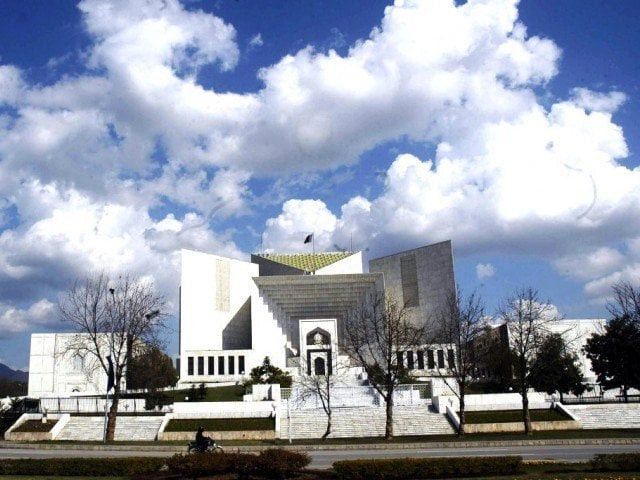Efficacy, backlogs and the court system
An analysis of Pakistan's judiciary

The Supreme Court of Pakistan. PHOTO: FILE
An analysis of the number of cases filed in the Supreme Court provides a useful insight into the general systemic challenges faced by all levels of the judiciary in Pakistan. During the year to May 2018, a total of 22,942 cases were filed in the Supreme Court. To better understand the significance or otherwise of this figure, a comparative analysis with other jurisdictions is instructive. In England and Wales — a legal system with many similarities with Pakistan — the UK Supreme Court had only 201 appeals lodged during the year to April 2019. Of these, only 59 were actually granted permission to proceed to a full hearing. The United States Supreme Court — a Supreme Court with a more similar constitutional jurisdiction — typically receives 7,000 to 8,000 applications each year. Again, the US Supreme Court only actually hears a small number of these applications, about 150 each year. The obvious question is: Why does the Supreme Court of Pakistan hear so many cases each year? Or perhaps the better question is: Why the US and UK Supreme Courts hear such few cases?
The answer is complex, but can arguably be boiled down to two principal reasons; firstly, both the UK and US Supreme Courts are greatly assisted by the presence of Courts of Appeal below them, which hear a far greater number of appeals. For example, in the UK the Court of Appeal has about 6,000 to 7,000 applications filed each year although it hears less than half of these. The second factor is that appeals will only be entertained by the UK and US Supreme Courts if the case involves an issue of general public importance. Neither Supreme Court will hear an appeal simply because one of the parties argues there is an error in a lower court’s decision. Both Supreme Courts restrict access by purposely ensuring that only the most legally significant cases are heard by them. They have the luxury to filter out the majority of applications they receive primarily because the courts below them function well. This allows them to not be overly concerned that wrong decisions may go unchecked. This is a significant factor. What this demonstrates arguably more than anything else is how important the functioning of the lower courts is to the health of the justice system as a whole. The Supreme Court of Pakistan and the High Court can debatably only function well if the courts of first instance are also functioning well.
This suggests that if you want to permanently reduce the backlog of cases in the Supreme Court of Pakistan, you also need to engage the lower courts. In 2014, there were a little under 3 million cases issued in the lower courts in Pakistan, with a backlog of approximately 1.4 million cases. In England and Wales, there are typically 4 to 4.5 million cases issued each year, with a backlog of about 300,000 cases. The judicial system in England and Wales therefore has more cases to get through each year and it does so with far fewer cases being appealed to the higher courts. This is perhaps an unfair comparison as these figures do not reflect the significant funding disparity between the UK and Pakistan court systems. While funding is undoubtedly a very significant factor, it is not the only factor to be considered when seeking to understand the difference in the efficiency of the two court systems. The other vital ingredient in the efficacy of a judicial system is the degree of active “case management” adopted by the courts.
The courts at all levels in Pakistan are in many ways in an impossible position. They have limited funding and at the same time are stuck with litigation rules that are ill-suited to disposing of a large number of cases. In these circumstances, it is unsurprising that there is a substantial backlog of cases. In the early 1990s, the UK faced similar problems of delay, spiralling costs and public dissatisfaction. The solution was the reforms proposed in the report Access to Justice by Lord Justice Woolf. The Woolf reforms led to the introduction of new litigation rules. At the heart of these new rules was the concept of active case management. While there is little the judiciary in Pakistan can do about funding, improving case management is an option. A start in this regard has already been made through a 2018 Peshawar High Court amendment to the Code of Civil Procedure. The amendment has introduced new and more robust case management provisions into the Code. Hopefully, this will lead to active case management being expanded further and more widely adopted by other courts.
Active case management can achieve more than just the improved efficiency of a court system. It can also improve judicial decision-making and the quality of litigation. When a case is actively managed, in my experience, it tends to concentrate the minds of all those involved. The judge will ensure that the issues are identified early on and will quickly dispose of any unmeritorious applications. The lawyers involved will be more likely to put their case as well as they can and as quickly as possible knowing they will not get another chance. Cumulatively, these factors result in a better final decision being made by the court, which is less prone to appeal. As evidence by the examples given earlier, better court decisions in the first instance go a long way in helping to permanently reduce the backlog of cases in the whole court system.
Published in The Express Tribune, September 6th, 2019.
Like Opinion & Editorial on Facebook, follow @ETOpEd on Twitter to receive all updates on all our daily pieces.















COMMENTS
Comments are moderated and generally will be posted if they are on-topic and not abusive.
For more information, please see our Comments FAQ